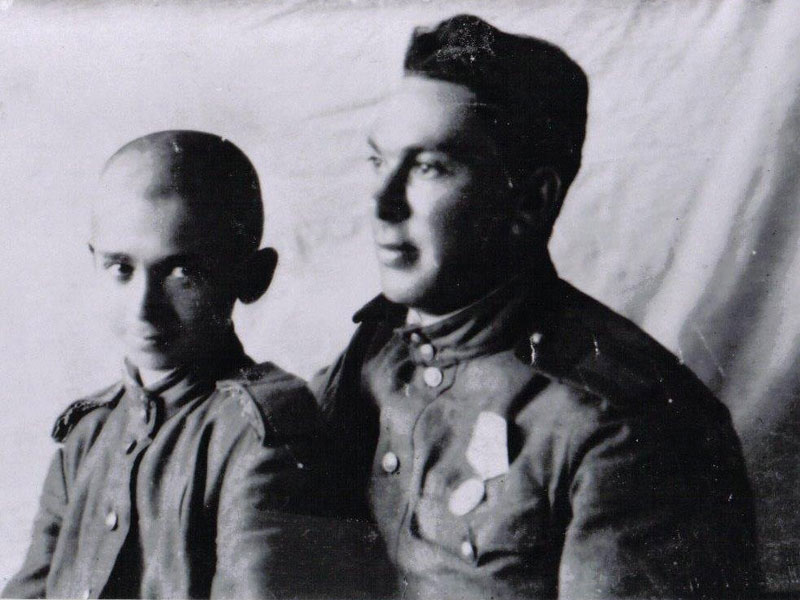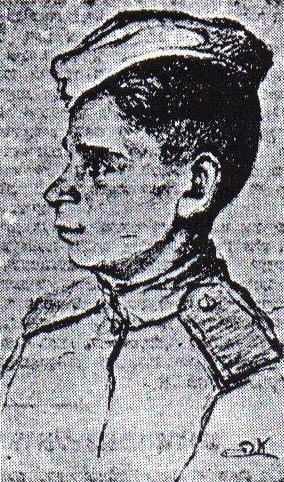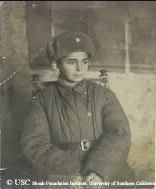Yehoshua (Alex) Levin was born in 1932 in the town of Rokitno, Vohlyn, Poland. As a child little Shike (nickname for Yehoshua) attended a heder (Orthodox Jewish elementary private school) and later theTarbut Zionist Hebrew-language school that operated in the town. Yehoshua and his two older brothers were also active in Betar (the Revisionist Zionist) youth movement. In September 1939, following the Molotov-Ribbentrop Pact, the Red Army entered Rokitno and the town, along with the whole Volyn Region, became part of the Soviet Ukraine.
When the Germans entered the town shortly after the outbreak of the war on June 22, 1941, Levin was living in the town with his family. As an inmate of a ghetto that had been set up, Yehoshua lived under harsh physical and hygienic conditions. In August 1942, during the liquidation of the Rokitno ghetto, Yehoshua Levin and his older brother Shmuel managed to escape from the collection point from which the Jews were taken to a killing site outside the town. After several weeks, while trying to join the partisans, they found themselves deep in the Polesie woods, where they met a few other Jews who had also escaped the Rokitno mass murder. Together they constructed a camouflaged dugout which they referred to as "the cave." The group hid there under very difficult conditions and in constant danger of being caught for more than a year and a half - until the liberation of the area by the Red Army in early January 1944. Immediately after the liberation, Joshua and his brother Shmuel returned to their hometown only to learn that all their close family members had been killed by the Germans. In Rokitno the Levin brothers met some Soviet troops. Boris Krupkin, a Jewish officer who was in charge of the 13th Army Field Hospital, decided to attach Yehoshua, a twelve-year-old orphan (who then weighed 30 kilograms) to the field hospital, providing him with food, health care, and a military uniform. At this time Joshua was separated from his brother Samuel when the latter joined another military unit. For the next year Alexander (Sasha) Levin (who had changed his Jewish first name to Alexander) was a “son of the regiment,” accompanying Red Army troops across Poland and into Germany. He served as a "young messenger" - helping out in the pharmacy by helping dispense medicines and providing aid to wounded soldiers and officers (e.g., by delivering to them letters, parcels, and papers). In 1945 Alexander was ordered to move to Moscow with other young war orphans under the care of the Red Army and given the opportunity to get an education. Levin dreamed of a military career. While in Moscow, he got in touch with Solomon Mikhoels, the chairman of the Jewish Anti-Fascist Committee (JAC) and a popular actor and director of the Moscow State Jewish Theater. Mikhoels wrote a letter of recommendation on Levin's behalf to the prestigious Suvorov Military School in Voronezh and in September 1945 Levin began studying there. He excelled in his studies but as a Jew he occasionally experienced antisemitic outbursts from the older cadets. After graduating a the silver medal in 1951 and competing his studies at the Kiev Infantry Military School in 1953, as a young officer in the Red Army Levin suffered from postwar antisemitic social and political discrimination. In 1957 he succeeded despite anti-Semitism in being accepted at the Leningrad Higher First Artillery Command School, from which he graduated as a military engineer in 1962. Five years later he was discharged from the army with the rank of captain. He subsequently worked in Moscow as an engineer in the oil industry. In 1975 Levin immigrated to Toronto (followed by his wife and daughter in 1980), where he worked for many years as an engineer and manager in different companies, eventually becoming the owner of a realestate business. From the early 1990s Alex Levin volunteered for various Holocaust-education organizations in Canada and elsewhere. In 2009 Alex Levin published his autobiography Under the Yellow& Red Stars.
Article in Eynikayt on Alex Levin
Shlomo (Solomon) Mikhoels introduced the young boy to prominent Soviet Yiddish writers, some of them members of the JAC. After interviewing Levin, on October 13, 1945 Y. Land published an article about Levin "Comrade Soldier of the Red Army," in the Committee's Yiddish newspaper Eynikayt. Written in a literary style, the article referred to Levin as a Jewish boy and emphasized the murder of his close family members and the other Jews of Rokitno by the Germans. After describing the boy's life hiding in the woods, the article related how he became a Red Army soldier, stressing the fact that as a Jewish survivor it was only natural for Levin to choose a military career:
"… After the shtetl of Rokitno is liberated, Shike Levin leaves the forest and comes to town…. He enters the liberated town wondering whom he would meet. Certainly no mother or father [since they had been murdered by the Germans] perhaps an uncle, an aunt or a neighbor.… He feels alone – [beforehand] the forest had acted as his father. It protected him.... An officer of the Red Army looks into his fearful eyes and asks him, 'Who are you?' 'Who am I?' A smile appears on Shike Levin’s face. 'I am a partisan!' The same evening, Shike Levin becomes a Red Army mascot. He is given a bath, fed well and supplied with a military uniform. Together with his unit, Shike went through the whole of Poland until he reached the German border. He serves as a “gofer” for the unit and every soldier knows him as the kid who brings letters and parcels from the military post office. The war ends in May 1945. One day in August, a young soldier of thirteen appears at our editorial office. The military uniform fits well and the boots are shined to a luster.… However, the military uniform makes him look more childlike.... I notice him and ask him, 'Who are you, boy?' He looks at me seriously and unwillingly replies, 'I am a Red Army soldier.' We become good friends and he explains that he had arrived in Moscow recently to attend the Suvorov Military Cadet School. 'So you want to be a military man?' I ask. 'Definitely. The Germans tried to annihilate us [i.e. the Jews]. That’s why I want to be a military man so that no one can ever do us any harm again.'"
From: Y. Land, "Khaver roytarmeyer" (Comrade Soldier of the Red Army), Eynikayt, October 13, 1945.









